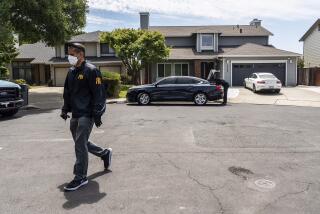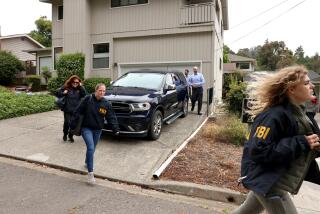Meese’s Personal Finances Being Probed by McKay
- Share via
WASHINGTON — Independent counsel James C. McKay is conducting an exhaustive probe of Atty. Gen. Edwin Meese III’s personal finances, examining all of his income and expenditures since at least 1985 to determine the possibility of impropriety, sources familiar with the case said Friday.
The inquiry, similar to what the Internal Revenue Service terms a “net worth” examination, is the type of expensive and time-consuming financial reconstruction often conducted by the IRS in cases in which persons are suspected of not having paid taxes on substantial illicit gains.
“The purpose is to see and analyze whether there was an unexplained amount of money coming to Mr. Meese,” one source familiar with the investigation said.
While acknowledging that such examinations are often used against organized crime figures and suspected drug kingpins, Meese attorney Nathan Lewin said it would be “the most outrageous thing in the world to draw a negative inference against him” because the investigative technique is being used in his case.
The investigation of Meese’s income and spending, being conducted by special IRS agent Eugene Cardillo and revenue agent Robert L. Charboneau, both assigned to McKay’s office, now is focusing on the period in which the attorney general’s investments were handled by W. Franklyn Chinn, the sources said. Chinn is a San Francisco financial adviser introduced to the attorney general by Meese’s longtime friend and former lawyer, E. Robert Wallach.
Wallach and Chinn were indicted in December on federal charges of defrauding the scandal-scarred Wedtech Corp. Wallach is accused of accepting funds to influence Meese as a government official to benefit Wedtech.
The painstaking study of Meese’s finances is intended mainly to determine whether he derived any benefit or promise of benefit from his relationship with Wallach while Wallach was representing Wedtech and promoters of a controversial $1-billion Iraqi pipeline, which also is at the center of McKay’s probe, the sources said.
The independent counsel’s investigators have not discovered any such quid pro quo that benefited Meese for official government actions related to Wallach’s clients--a connection that sources say would be the key missing link in any case that could be built against the attorney general.
Earlier Transactions
Lewin said the examination covers transactions made before 1985, when Meese invested his funds with Chinn in what the attorney general described as a limited blind trust. The probe examines Meese’s finances during all of his eight years in Washington, as President Reagan’s counselor and later as attorney general, Lewin said.
The attorney general’s lawyer contended that “very few people” could withstand such scrutiny.
To determine whether Meese received or was promised anything in return by Wallach, Chinn or others, the investigators are known to be investigating these actions by Meese:
--His 1982 intervention, at Wallach’s repeated request, with the Pentagon that led to the award of a no-bid, $32-million Army engine contract to Wedtech. Meese, who received an estimated dozen memos from Wallach promoting the company, has said he was interested only in assuring that Wedtech was given “a fair hearing.”
Stock in Baby Bell
--His support as attorney general for efforts to ease court-imposed restrictions on the so-called Baby Bell telephone companies when he owned $14,000 in stock of the former AT&T; subsidiaries. Meese obtained a waiver from Reagan’s counsel to take part in the matter, but critics say the waiver was based on incorrect information furnished to the White House by Meese.
--His arrangement for Wallach, who was retained by a major financier in the Iraqi pipeline project to help obtain Washington support, to meet with then-National Security Adviser Robert C. McFarlane, and his exchange of handwritten correspondence with then-Israeli Prime Minister Shimon Peres about the secret project.
--His investment, at Wallach’s suggestion, of about $50,000 with Chinn, which the financial adviser turned into about $95,000 over an 18-month period--a return exceeding 80%. Meese, who had promised during his Senate confirmation hearings to avoid speculative investments in response to questions about his finances, recently praised as “conservative” Chinn’s tactic of selling new issues of stock on the same day he bought them.
McKay’s investigation of actions by Meese that benefited Wedtech has been at a standstill since Dec. 22, when a federal grand jury in New York indicted Wallach, Chinn and a Chinn associate on racketeering, mail and wire fraud and conspiracy charges in the case. At that time, McKay said there was insufficient evidence to indicate that Meese “knowingly participated in criminal activity in connection with his Wedtech actions.”
Took Fifth Amendment
McKay noted that Wallach and Chinn had invoked Fifth Amendment privileges against self-incrimination rather than testify in the Meese investigation but said he might still seek their testimony after their own trial is completed. That situation remains unchanged, although sources familiar with McKay’s inquiry say he probably will not wait until the trial of Wallach and Chinn is completed before issuing a report on Meese’s Wedtech involvement.
In the Baby Bell inquiry, sources familiar with the matter said, McKay has not developed information showing that Meese had knowledge his actions favoring the companies’ effort to lift restrictions would have a direct impact on his stock holdings. Establishing that he did have such knowledge would be a key element in proving conflict of interest in the matter, legal sources said.
In the Iraqi pipeline investigation, a critical piece of evidence is a memo that Wallach wrote to Meese on Sept. 25, 1985, stating that as much as $700 million in proceeds from the project over 10 years would go to Israel. In return, Israel would not attack the pipeline, which was to run close to its border with longtime enemy Iraq but was never built.
Wallach, referring to it as “the arrangement with Peres,” wrote also that he understood that part of the funds would go to the Israeli Labor Party, which is headed by Peres.
Corrupt Practices Act
McKay has been investigating the arrangement to determine whether it may have violated the Foreign Corrupt Practices Act, which forbids U.S. citizens to bribe foreign officials and empowers the attorney general to take legal action to prevent an apparently imminent violation.
“The payment may be indicated, but it’s not stated, and you don’t go to court as a prosecutor with indications,” one source said.
Further weakening any case is the fact that Bruce Rappaport, the Swiss oilman who retained Wallach and whom Wallach cites as the source of the memo’s information, denied there was ever any plan to funnel funds to the Israeli Labor Party. He has attributed the allegation to what he called a “twisted” account by Wallach in the 1985 memo.
More to Read
Get the L.A. Times Politics newsletter
Deeply reported insights into legislation, politics and policy from Sacramento, Washington and beyond. In your inbox twice per week.
You may occasionally receive promotional content from the Los Angeles Times.










